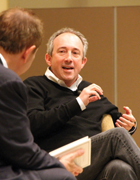By Amy E. Hamaker
Don’t wear stilettos. Cultivate “om” in the office. Know your grocer. Smile.

David Agus, professor of medicine at the Keck School of Medicine of USC, and Keck School Dean Carmen A. Puliafito discuss the rules for living a healthy life during a recent lecture in the Dean’s Distinguished Lecturer series.
Photo/Jon Nalick
These topics aren’t just good advice for living a happier life, but also a healthier one, according to David Agus, MD, professor of medicine at the Keck School of Medicine of USC. Agus and Keck School Dean Carmen A. Puliafito, MD, MBA discussed Agus’ new book A Short Guide to a Long Life as part of the Dean’s Distinguished Lecture Series on Jan. 15 in Mayer Auditorium.
The 208-page book groups 65 rules into two chapters titled “What to Do” and “What to Avoid,” followed by a chapter titled “Doctor’s Orders,” which offers advice on how to care for your health in your 20s, 30s, 40s, 50s and beyond. The book recently sold out of its third printing, and is on the New York Times best-seller list.
Agus explained the differences between his first book, The End of Illness, and his new book. “The End of Illness was really a science book,” noted Agus. “This is more of a how-to book. I wanted to appeal to people who don’t know what to do to prevent disease.”
According to Agus, chapters were written in an easy-to-access style, grounded in common sense and solid science. “For example, take the ‘don’t wear stilettos’ tip,” Agus explained. “In a recent study where people were asked what they wish they would have done differently in taking care of their health, the two top answers were taking better care of their teeth and taking better care of their feet.”
Agus’ advice for movement, eating habits, lifestyle changes are designed to be preventive, drawing on knowledge gained from well-controlled clinical trials with results gained over time. “There’s a lot of wrong information out there about health, and not enough good leadership,” he said, citing the importance of doing your own health assessment. “In today’s world, you get just a few minutes with the doctor; you need to know your own body so that, you know what to talk about,” he said. “Keep a log, and you’ll start to see correlations. With enough data, error goes away.”
“Dr. Agus is a clinician-scientist, and there is no question of his commitment to health and fighting cancer,” added Puliafito. “As an oncologist, scientist and teacher, he has demonstrated a willingness to look beyond conventional wisdom to help his patients and others find health answers that work for them. It’s an honor to have him among our distinguished faculty.”

